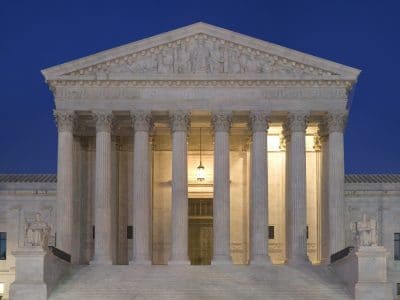
Editor’s note: This article first appeared at the Washington Examiner.
Michael Bloomberg is spending loads of money to win the Democratic nomination. Financial disclosures made by the Bloomberg campaign indicated that as of Dec. 31, he had sunk more than $200 million into his organization. Last week, the Los Angeles Times reported that he has already spent more than $100 million on advertising in the Super Tuesday states alone. He is luring top consulting talent by offering lavish salaries, new iPhones, MacBooks, and other amenities. With a net worth of more than $50 billion, he can easily afford it.
The former mayor of New York City has drawn criticism for his free-spending ways. As Rich Lowry wrote for Politico, “Bloomberg 2020 is still an affront to small-d democratic sensibilities, a tribute not to his superior political skills or messaging compared with the other candidates, but his access to a personal bank account that the rest of them lack.”
Lowry is certainly correct. Bloomberg’s candidacy has more than a whiff of aristocracy, or even monarchy, to it. One of the virtues of kingly government, it was once thought, was that the sovereign was placed in such an elevated position that he could not be purchased. He had all the wealth and social status he could possibly desire, and so his main motivation would be glory, a drive that would attach his interests irrevocably to the national good. Among the Founding Fathers, Alexander Hamilton was a strong advocate for such a “high toned” executive. He wanted a president who embodied the virtues of the “natural” aristocracy — wisdom, prudence, courage, and so on — and who was separated from what he called the “small arts of popularity.”
Apply these ideals to Bloomberg, and there is overlap. His wealth has enabled him to spend lavishly on campaign ads without having to worry about financing, be it through cultivating ideologues who give small-dollar amounts or wealthy interests who bundle contributions and give millions to super PACs. It has allowed him to skip the early contests, and thus not have to worry about pressing the flesh with voters in New Hampshire and Iowa, who are used to presidential candidates deferring to their parochial concerns. It has made it easy to put together a top-flight, no-expenses-spared campaign organization in which he can easily pay lavish salaries for political consultants without worrying about its effect on his bottom line.
And by the same token, his vast fortune has allowed him to donate lavishly to various Democratic causes, which has bought him a measure of goodwill. Stacey Abrams, the Democrat whose narrow defeat in the 2018 Georgia gubernatorial contest has made her a cause celebre among progressives, seemed to go against type last week when she praised Bloomberg. But it turns out that he had given millions of dollars to her political organization. As one blogger at the progressive DailyKos put it, “Money CAN Buy You Love.”
Americans have a knee-jerk negative reaction to this kind of nest-feathering, but it does have its virtues. Defenders of aristocratic government would say this is a good thing because Bloomberg cannot be bought. He is free to pursue the national interest, and if he has to bribe petty politicians and consultants to work on behalf of the public good, then is it not a good thing that he has the resources to do it? No less an eminence than David Hume, the great philosopher of the Scottish Enlightenment, argued that the power of the king to bribe the Parliament was “necessary” for the maintenance of the British system of government, which Hume (and others, such as Montesquieu) believed was the greatest the world had produced up to that point in time.
The problem with this view, however, is the implicit assumption that a king has the virtue, wisdom, or perspective to appreciate what the national interest is. And the same may be said of Bloomberg. It is good that he cannot be bought, but he still nevertheless represents a narrow slice of American society. Does he have the true interests of the United States at heart? Does he have the wisdom and temperament to bring his vision of America into being? Maybe, but maybe not. And the problem is that, against a man of such wealth, who is able to dominate the airwaves, pay elaborate fees to consultants, and lavish donations upon charitable organizations of would-be critics, it is difficult to raise questions like that, at least to a volume loud enough for people.
But is the Bloomberg model of campaign finance much better than the status quo? Not necessarily. Consider, for instance, House Speaker Nancy Pelosi’s public tearing up of President Trump’s State of the Union address. That was manifestly a play to the small donors who increasingly fund political campaigns. Moreover, think of all the economic interests that contribute to politics, particularly on the congressional level, in pursuit of this or that bounty that the federal government can bestow.
Is self-financing by an out-of-touch billionaire obviously worse than a politics financed by uncompromising, ideological purists and special interests? No. Both shift our politics away from the political center, where compromise, mutual accord, and even harmony can be discovered.
If nothing else, the Bloomberg candidacy reveals the uncomfortable yet undeniable fact that Americans have naive views about how politics should be financed. In a continent-spanning republic of 330 million people, it is very expensive to campaign for public office, especially the presidency. And while people collectively have identified sources of money that we do not like, such as special interest groups, labor unions, ideological extremists, self-funding billionaires, we have never as a people thought seriously about where the money should come from. And thanks to our collective lack of deliberation, a system of financing built on conflicts of interest and ideological extremism has flourished.
If we the people decide that the Bloomberg model is an unacceptable alternative to the status quo, we still need to think seriously about how current campaign finance laws distort our democracy. And we need to have a public discussion among all ideological persuasions, conservatives, centrists, and liberals, about how we go about paying for politics.




